Stressed Out? Can’t Sleep? Try These Relaxing Essential Oils
In a hurry? Click here to read the Article Summary...
We can all likely agree that the past year has been at least somewhat (if not extremely) stressful. Prior to the Covid-19 pandemic, many of us seemed to struggle with how to slow down our busy lives. Now we all seem to be stressed to the max for a multitude of other reasons. No matter what the root cause, it can be difficult to calm down enough to enjoy a good night’s sleep when our nervous systems are revved up.
Fortunately, there are actions we can take to quiet our minds and relax our bodies. One of these practices is meditation, which calms the brain and nervous system significantly. Meditation combined with aromatherapy, however, can take your mindfulness practice to a whole new level.
If you haven’t tried aromatherapy or don’t know much about it, you might think it’s just a way to make a room smell better. But scientific research reveals it’s a good deal more than that… especially when it comes to helping us soothe an anxious mind and keeping our blood pressure under control.
The Research Into Calming Essential Oils

Several small clinical trials have been conducted on the action of essential oils and aromatherapy on mood, the nervous system, and the cardiovascular system.
For instance, a 2006 clinical study [1] included 52 people with hypertension (high blood pressure). Researchers looked at the effect of a lavender oil, ylang ylang, and bergamot essential oil blend on blood pressure, pulse, anxiety levels, and blood cortisol levels – the hormone released when a person is stressed.
The patients were randomly assigned to either inhale an essential oil blend, a placebo, or nothing. After four weeks of inhaling just once daily, the group receiving the calming essential oil blend fared much better than the other two groups.
Researchers found that the inhalation of these relaxing essential oils reduced psychological stress and blood cortisol levels, and reduced blood pressure in hypertensive patients.
Improved Quality of Life and Sleep
A 2017 clinical trial [2] sought to discover the effectiveness of essential oils on 132 busy working women. The women were randomly assigned to one of four groups who received either:
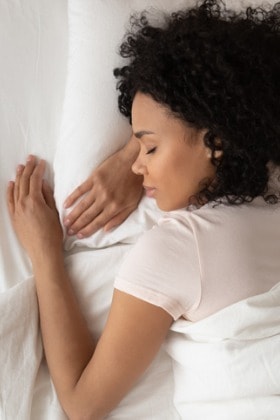
- distilled water
- lavender essential oil
- a blend of essential oils (equal parts lavender, clary sage, and oregano)
- acupressure massage
After four weeks, all the groups receiving either essential oils or acupressure reported an improvement in quality of life and sleep. Of these three groups, the one receiving the calming essential oil blend exhibited greater benefits in both quality of life and sleep quality compared with the other groups.
Decreased Anxiety & Better Sleep
Another clinical trial reported in 2017 [3] investigated the use of lavender essential oil for patients with coronary artery disease hospitalized in the intensive care unit. The patients were finding it difficult to sleep.
The patients who were given lavender essential oil inhalation for 15 days showed statistically significant improvements in sleep quality and anxiety levels than those not receiving the oil.
While the number of clinical studies has been small thus far, they have very clearly indicated that the use of calming essential oils and aromatherapy can have some very real and quantifiable benefits for those with:
- stress and anxiety
- high blood pressure
- trouble sleeping
4 Fabulous Relaxing Essential Oils
- Lavender (Lavandula angustifolia)
- Ylang Ylang (Cananga odorata)
- Clary Sage (Salvia sclarea)
- Bergamot (Citrus bergamia)
Research shows that certain calming essential oils such as lavender, ylang ylang, clary sage, and bergamot can:
- Calm stress and anxiety
- Improve quality and depth of sleep
- Lower blood pressure and heart rate
- Decrease levels of cortisol
- Act as natural anti-depressants
- Help to stabilize emotions
1. Lavender (Lavandula angustifolia)
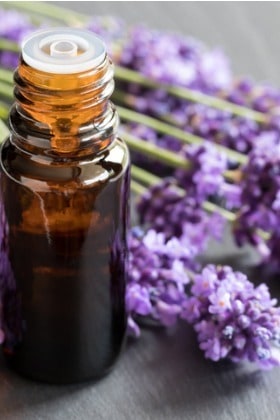
Cold-pressed from the flowers of the lavender plant, lavender essential oil is highly prized for its calming effects on the nervous system.
A 2009 study [4] found that lavender improved mood and reduced anxiety and depression.
A small 2019 clinical trial [5] found that breathing in lavender boosted blood melatonin levels in both older adult men and women. Melatonin is a hormone that has a role in regulating the sleep-wake cycle.
A small clinical study reported in 2020 [6] involving 52 diabetic patients suffering from insomnia found that inhaling lavender improved sleep quality and quantity, as well as the quality of life and mood in the patients using it.
2. Ylang Ylang (Cananga odorata)
Steam distilled from the flowers of the ylang ylang tree, also known as Perfume Tree, this calming essential oil has been revered by native people in the islands where the tree grows for promoting feelings of peace, well-being, and even as an aphrodisiac.
A small 2016 animal study [7] on ylang ylang found that it had significant anti-anxiety properties. Ylang ylang appeared to work by modulating certain neurotransmitters in the brain.
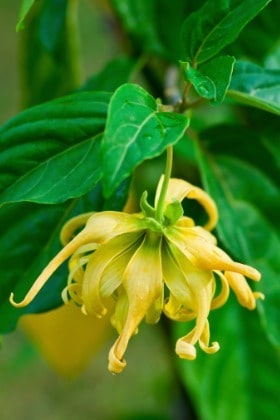
A 2018 animal study [8] investigating this effect of ylang ylang found that it did indeed have anxiolytic (anti-anxiety) activity. It worked by regulating the release of serotonin in the brain, which is a chemical messenger released by nerve cells. Serotonin plays a large role in regulating anxiety, reducing depression, and improving feelings of well-being.
A 2013 clinical study [9] with actual humans investigated the effects of ylang ylang on 29 healthy male volunteers. The volunteers were given either:
- ylang ylang, or
- nothing other than air to breathe over a period of one hour
Researchers found that after that hour, those breathing in the ylang ylang had decreased blood pressure and heart rate. Researchers noted that ylang ylang had the effectiveness of a sedative.
3. Clary Sage (Salvia sclarea)
Steam distilled from the flowers of this plant, it is thought to be so-named because in the Middle Ages clary sage was used as an eyewash. The name comes from the Latin word clarus which means “clear” (as in clear eyes). Clary sage has long been used by herbalists for its calming effects, management of female hormonal health, and many other health complaints.
With regard to the abilities of clary sage to modulate moods, a 2010 animal study [10] found that clary sage had anti-depressant action, and it worked by modulating the activity of dopamine, which is both a neurotransmitter and a hormone. Dopamine plays a role in how we move and affects our moods, memory, and motivation.
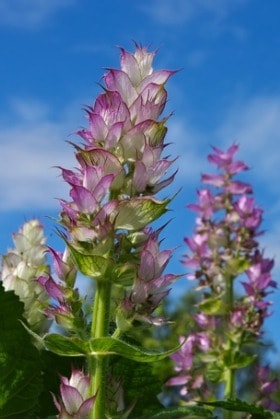
A clinical trial reported in 2013 [11] examined the effect of clary sage and lavender on the autonomic nervous system of 34 female patients with urinary incontinence. The patients were about to undergo a urodynamic test, which made them feel nervous and embarrassed (due to the need to urinate in front of a hospital tester).
Each of the women was given either clary sage oil, lavender oil, or almond oil to breathe in for an hour prior to the test. Researchers found that the women in the clary sage group experienced a significant decrease in systolic and diastolic blood pressure and a significant decrease in respiratory rate.
A 2014 clinical trial [12] investigated clary sage’s ability to reduce stress and depression in 22 post-menopausal women. They found that inhaling clary sage essential oil reduced cortisol levels by up to 36%. Clary sage inhalation also improved thyroid hormone levels and had an anti-depressant effect.
4. Bergamot (Citrus bergamia)
Thought to be a hybrid between a lemon or lime tree and bitter orange, bergamot oil is cold-pressed from the rind of the bitter-tasting fruit of this tree. Historically prized for its fragrance and used in perfumes (and Earl Gray tea), bergamot has attracted attention more recently for its natural mood-enhancing activity.
A 2015 animal study [13] on rats subjected to stress had some interesting findings. Researchers tested the effects of both bergamot essential oil and a pharmaceutical called fluoxitine (also known as Prozac) on the rats. It was discovered that the rats inhaling bergamot oil exhibited less depressive behavior and that this effect was similar to the rats receiving the Prozac.
In a small 2011 clinical study [14], researchers investigated the effects of a blend of bergamot and lavender on 40 healthy human volunteers. The volunteers applied the blend of oils to their abdomens daily. At the conclusion of the trial, researchers found that compared with the placebo group, the group receiving the essential oil blend had significantly decreased pulse rate and blood pressure. The volunteers also said that they felt calmer and more relaxed.
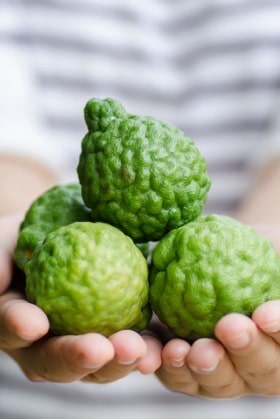
A clinical study reported in 2015 [15] involved 41 healthy female volunteers. The women were split into three groups. One group received rest only; one group received rest and water vapor to breathe; and one group received rest, water vapor, and bergamot oil to breathe. The researchers found that those receiving the rest, water vapor, and bergamot oil had significantly lower cortisol levels after just 10 minutes of use.
A 2015 review of research [16] investigated the effects of various essential oils on anxiety levels in animals. Among the oils tested, bergamot was found to have the most effective anti-anxiety activity.
In 2017, researchers examined the neurobiological effects of bergamot oil on rats [17]. They found that bergamot oil had significant anti-anxiety effects and induced relaxation in the animals.
4 Tips for Using Calming Essential Oils
Editor’s Note: Organixx used to carry an essential blend called Relaxx that was a blend of lavender, ylang yang, clary sage, and bergamot essential oils. If you have any Organixx Relaxx Essential Oil blend, these are some ways you can use it.
1. Inhalation Method.
Place a drop or two of your favorite calming essential oil(s)* into the palm of one hand, rub both palms together, and then place your hands over your nose and mouth, being careful to avoid your eyes. Fill your lungs with the aroma, holding the oil vapor in your lungs for a good 5-10 seconds (or as long as you can). This technique helps to get the essential oils into your lungs, and from there into your bloodstream very quickly. This is great to do prior to bedtime or anytime you feel anxious or stressed.
*use oils individually or try mixing two or more oils to make a blend.
2. Relaxation Bath.
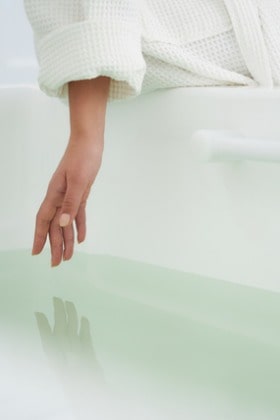
Essential oils are not water-soluble, so dripping them directly into a bath will only result in a film of undiluted essential oils sitting on top of the water which could be irritating to very sensitive skin. What you need is a dispersant. Good ones to use are fractionated coconut oil, olive oil, or a liquid castile soap.
Mix 5-20 drops of essential oils per 1 tablespoon of your chosen dispersant. Make sure the bathwater isn’t too hot, but warm enough that you can relax and breathe in the aroma for a quiet, calming experience.
3. Deepening Meditation Practice.
Combining calming essential oils with meditation can be very powerful. Using a calming essential oil blend (see step #1) just prior to meditation can help to calm down your nervous system, bring about a state of peaceful awareness, lower your blood pressure, and ease anxiety. Just a few moments of deep breathing prior to meditation can add another dimension to your meditation practice.
4. Calming Agitated Kids.
You don’t need to put the oil on the kids… just wear it yourself like a perfume. Waft it around the room where older child(ren) are playing or fighting. Or use a cool-mist essential oil diffuser for 10-20 minutes in the family area.
Closing Notes of Caution
Avoid the use of essential oils on sensitive areas of the body (e.g., inside ears and around genitalia) and never near the eyes. If you wish to use essential oils with children or while pregnant or breastfeeding, you should ALWAYS exercise extreme caution and seek a qualified practitioner’s advice prior to use.
Remember too that essential oils are not intended to be used as replacements for medicine, but to support overall health and well-being. For any persistent health problems, always consult your physician.
The powerhouse trio of herbs in Magi-Complexx Essential Oil provides the strongest, most synergistic healing effect, helping sufferers of arthritis pain, constant muscle aches and pains, neuropathy, systemic inflammation, slowed wound healing, circulatory challenges, as well as skin irritations like eczema, psoriasis, and acne.
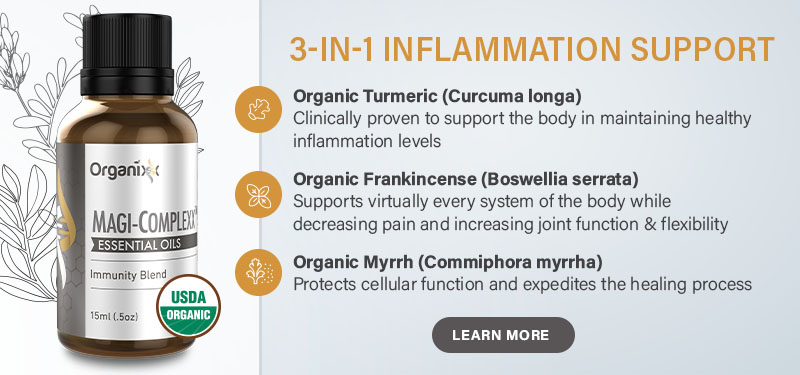
 Sources:
Sources:
Article Summary
If you haven’t tried aromatherapy, you might think it’s just a way to make a room smell better. But scientific research reveals it’s a good deal more than that… especially when it comes to soothing an anxious mind and keeping blood pressure under control.
Several small clinical trials have been conducted on the action of essential oils and aromatherapy on mood, the nervous system, and the cardiovascular system.
These studies have very clearly indicated that the use of calming essential oils and aromatherapy has real benefit for those with:
- stress and anxiety
- high blood pressure
- trouble sleeping
4 essential oils known for their calming benefits are:
- lavender
- ylang ylang
- clary sage
- bergamot
These oils have been shown to assist the body in 6 key ways:
- Calming stress and anxiety
- Improving quality and depth of sleep
- Lowering blood pressure and heart rate
- Decreasing levels of cortisol
- Acting as natural anti-depressants
- Helping to stabilize emotions
4 ways you can use these oils individually or in combination are (see details in article):
- Inhalation
- Relaxation bath
- Deepening your meditation practice
- Calming agitated kids by wearing it around them


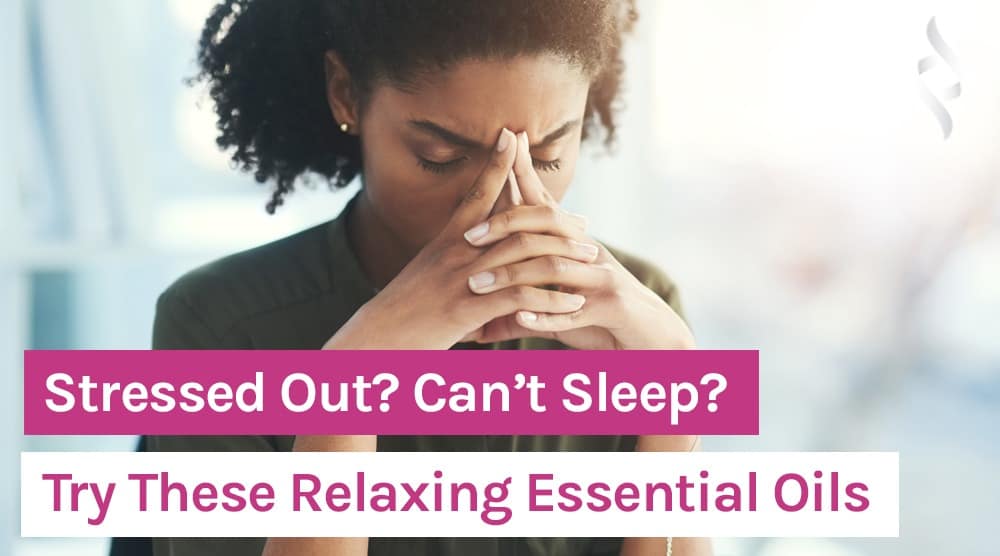
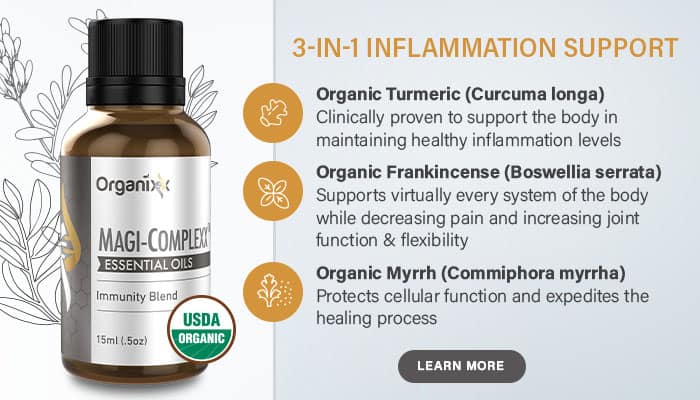


Is RELAXX essential oil blend out of stock or discontinued? Have been using it but haven’t been able to find it on your website lately. If it’s been discontinued, could you provide me with amounts of carrier oil and each of the oils contained in RELAXX? IREALLY need to use it for chronic insomnia plus cancer recovery. I appreciate any help you can provide.
Thanks!
Mary Backs
Hi Mary! We appreciate your interest in our Relaxx Essential Oil Blend.
Like you, we have loved having the essential oil blends as part of our product family! To quote a caring friend of us all, “ How lucky were we to have something that makes saying goodbye so hard.” (Winnie the Pooh)
However, occasionally we reevaluate our product line to assure we are providing the products our customers want the most. With that in mind, Organixx has made the decision to discontinue all of our essential oil blends excluding Magi-Complexx.
We are so sorry for any inconvenience this has caused.
You may view our selection of avail essential oils here:
https://shop.organixx.com/#essential-oils
To add, you may read more information about the Relaxx Essential Oil below:
Relaxx Essential Oil is a calming blend of Lavender, Ylang Ylang, Clary Sage, and Bergamot. This blend is used for natural anxiety relief. For natural anxiety relief, add 2-3 drops to your favorite carrier oil and put in your palm. Then rub onto your neck. You can also rub it into the bottoms of your feet.
Please let us know if you have any further questions. Wishing you a lovely weekend!
I just found out that Organixx has discontinued the Relaxx essential oil blend. I am so sorry to see it go,
it is such a beautiful blend of essential oils and truely
llves up to its name. I will miss using it before bed, it
really does help me to relax and fall asleep faster. I
hope you can bring it back in the near future.
Thank you
Verna Samarin
Where can I buy your essential oils?
Hi Charise,
We appreciate your inquiry about essential oils.
Currently, the Organixx product line no longer carries essential oils. We sometimes have to make hard decisions regarding our products based on the marketplace and other variables. With that in mind, we had to say a sad goodbye to our beloved Essential Oils product line.
While making the decision to remove our Essential Oils inventory was not an easy one, it allows us to have a laser focus on our current products to ensure we are doing everything we can to fulfill our mission for your continued good health.
However, we do have a suggestion for you!
We have signed on with an affiliate that can continue to provide similar USDA organic essential oils that Organixx used to carry.
Please give Rocky Mountain Oils a try by following this link: https://www.rockymountainoils.com/?sscid=41k7_tzv4b&utm_medium=3060444&utm_campaign=1813834
We hope you are as impressed with Rocky Mountain Oils as we are.
We hope this helps and wish you a happy & healthy day.
Your comment is awaiting moderation.
Hello,
Joining the group missing RELAXX. I’m an avid user of oils and RELAXX is truly one of the best blends out there. Has saved me 100x. Any way we can get the ratio to make from singles? I have them all and experiment but hoping you’ll share as there nothing else out there on the market that I’ve found. Thank you! :)
Thanks for the interesting article. You mention certain studies but they are not linked to this blog. Can you tell me where to find them eg per your article: In a small 2011 clinical study [14], where is this source?
Hi Gail,
You can find the sources by scrolling down to the word sources and clicking the arrow to view the information. The word sources is underneath the picture of the author. I hope you find this information helpful. Enjoy your day! :)